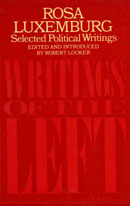
Rosa Luxemburg
Selected Political Writings
Luxemburg, Rosa (edited with an introduction by Robert Looker)
Publisher: Jonathan Cape, London, United Kingdom
Year Published: 1972
Pages: 309pp ISBN: 0-224-00596-0
Dewey: 335.43
Resource Type: Book
Cx Number: CX6545
A selection of Rosa Luxemburg's writings which highlight her outstanding contributions to the theory and practice of revolutionary socialism.
Abstract:
-
In his introdution, Looker writes:
"Against the crude schematism which posed the party as the active, conscious catalyst which stimulated the inert, unconscious -- or 'trade union' conscious -- class into revolutionary struggle, Luxemburg re-asserted the central Marxist insight that the proletariat makes itself, and its own awareness of itself, in the course of a struggle rooted in the logic of capitalism. Yet this was not to say that socialist consciousness was an automatic or necessary product of the class struggle. Rather, it was a demand that socialists must take the consciousness of the class, not as some passive, reactive element, but as an active and continuously changing reality which must form the central focus of all socialist analysis and activity.
The necessary complement to her analysis of mass action was that theory of creative political leadership which we have already encountered and which now received a more systematic articulation in her work. True, such a leadership cannot create the class struggle, for that struggle is an elemental feature of the capitalist system itself. Equally, it cannot direct that struggle along lines predetermined by that leadership, for the revolutionary struggle is a complex pattern of conflicts spanning decades, not a set-piece engagement between the disciplined armies of capital and labour. However, only conscious socialist politics can hope to lead that struggle towards its ultimate goal, the achievement of a communist society, and such politics demand a creative leadership which is capable of responding directly to each and every manifestation of the class struggle, stimulating that struggle, widening its goals, generating new tactics, etc., in that dialectical inteplay of consciousness and activity which forms the core of the relationship between the revolutionary party and the proletariat."
Table of Contents:
Introduction
I Defending the Tactic 1898-1904
1. The Opportunist Method
2. The Consequences of Social Reformism and General Nature of Revisionism
3. Opportunism and the Art of the Possible
4. The Militia and Militarism
5. The role of organization in Revolutionary Activity
6. Social Democracy and Parliamentarianism
II The Widening Offensive 1905-14
1. The Revolution in Russia
2. The Interaction of the Political and The Economic Struggle
3. Need for United Action of Trade Unions and Social Democracy
4. The Two methods of Trade-Union Policy
5. The Next Step
6. concerning Morocco
7. What Now?
8. The Political Mass Strike
III The Great Divide 1914-18
1. Socialism and War
2. Rebuilding the International
3. Either-Or
4. The Old Mole
5. The Russian Tragedy
6. The Problem of Dictatorship
7. Democracy and Dictatorship
IV Into the Revolution November 1918-January 1919
1. The Beginning
2. A duty of Honour
3. The National Assembly
4. To the Proletariat of All Lands
5. The Acheron in Motion
6. What does the Spartakusbund Want?
7. The Elections to the National Assembly
8. What Are the Leaders Doing?
9. Houses of Cards
10. Order Reigns in Berlin
Selected Bibliography
Subject Headings


